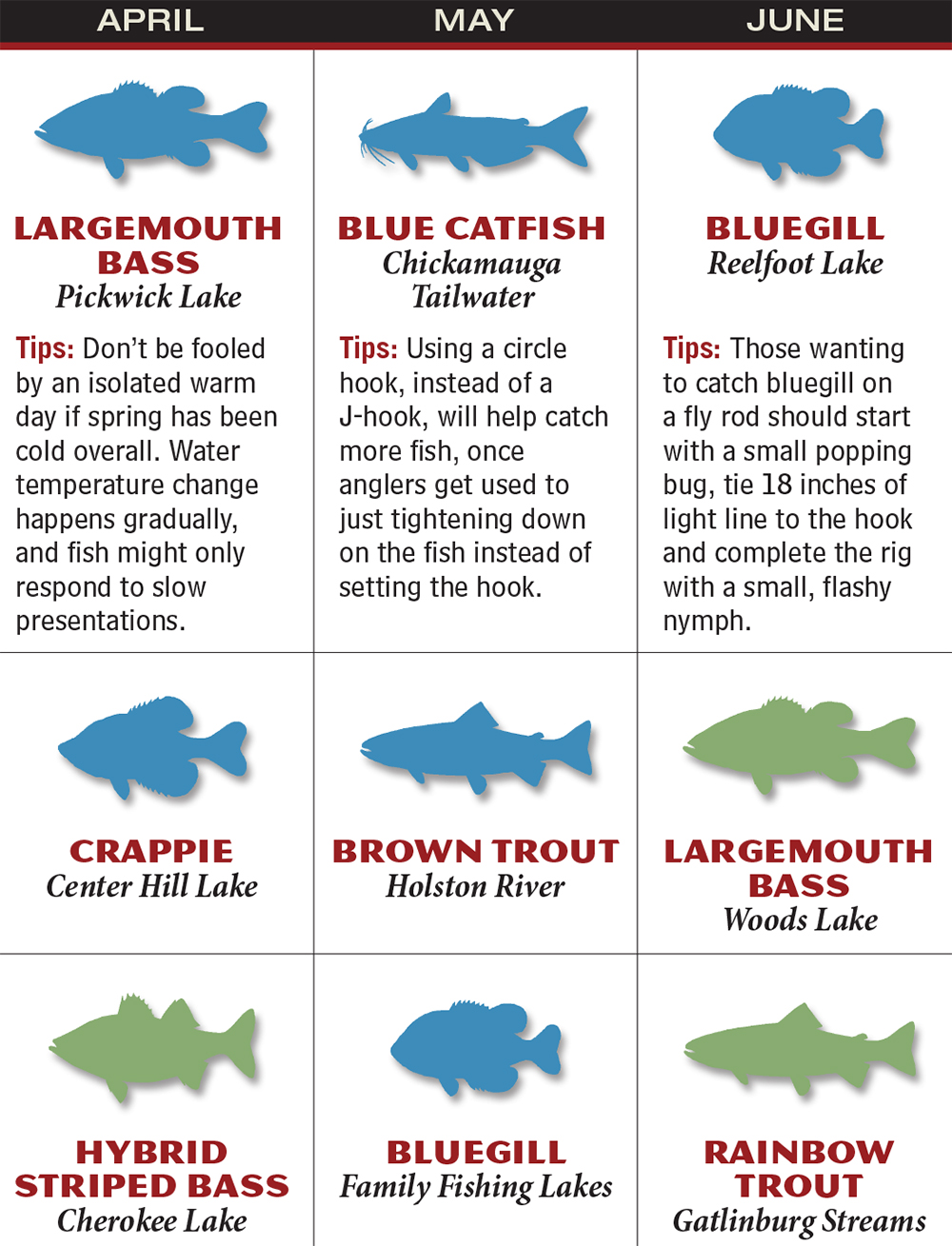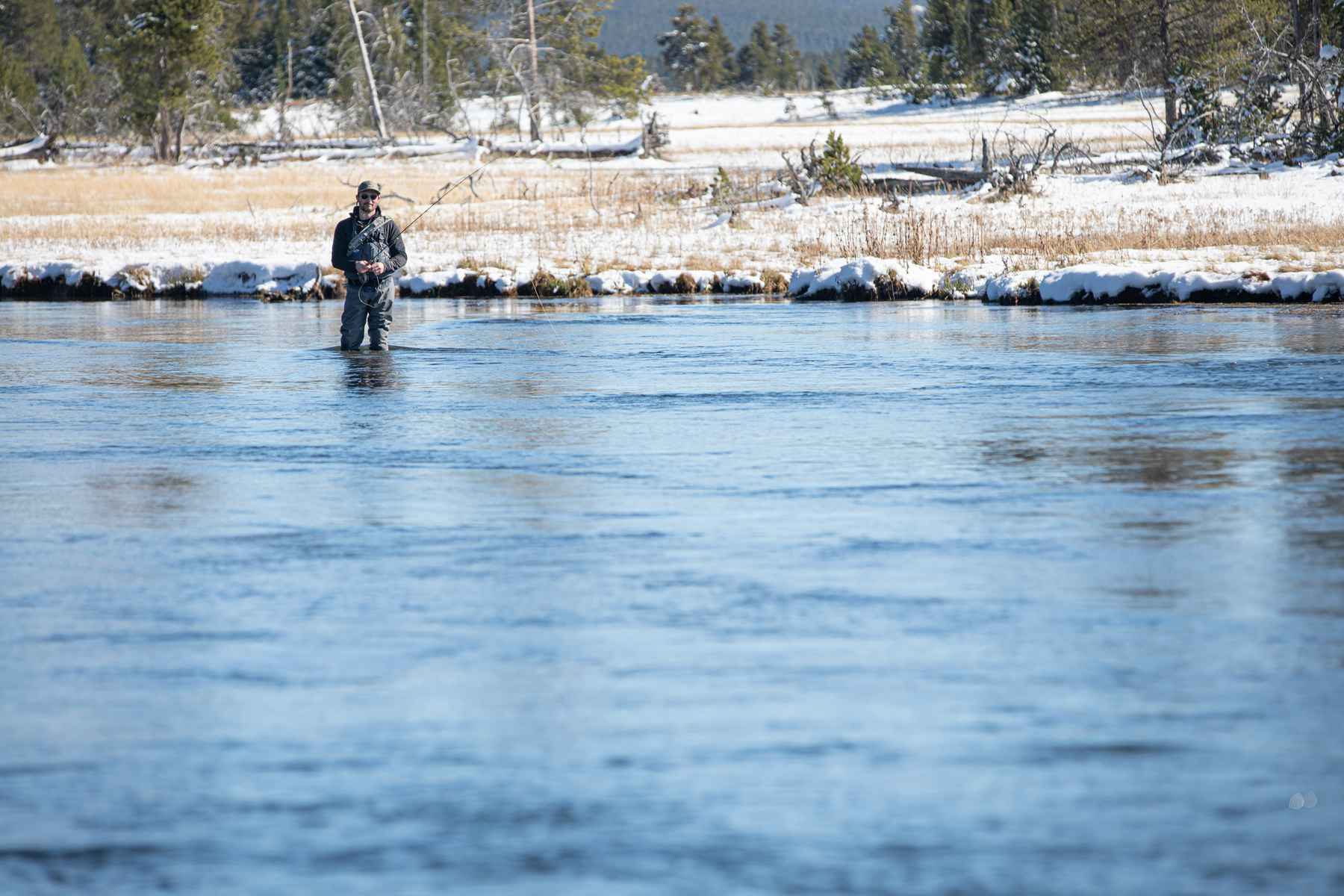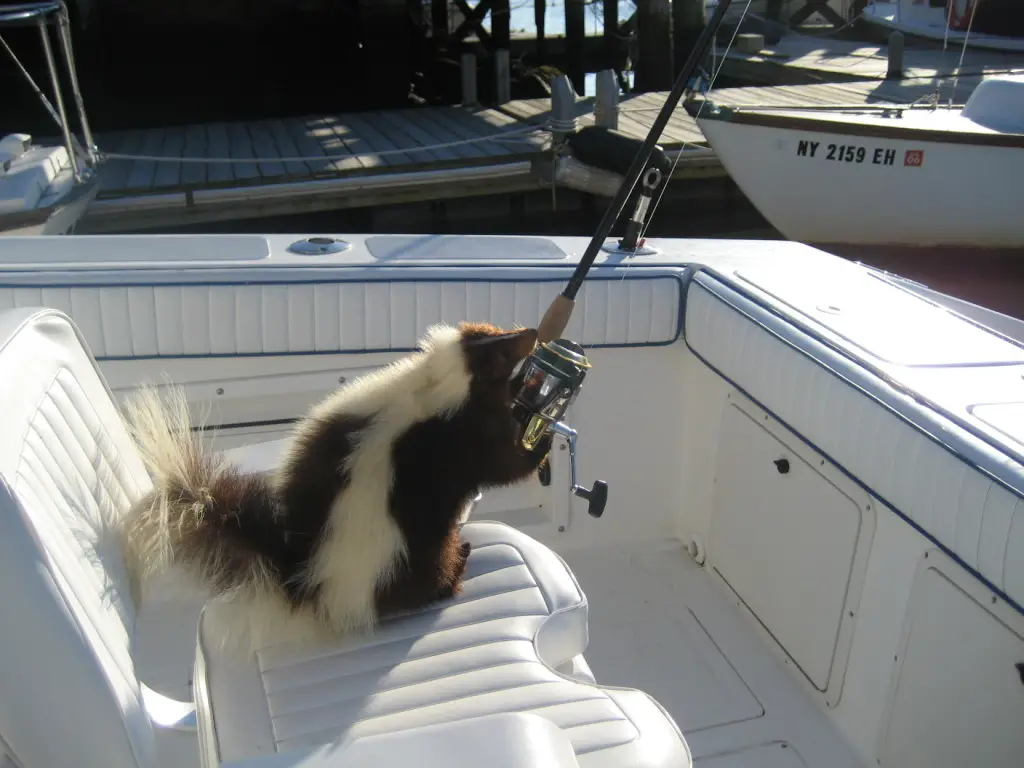Remember the saying” Any day fishing is a good day” Still not too many fishermen ask when the worst time to go fishing is but to find out when the worst time to go fishing is, you need to know when the best time is to go fishing thereby improving your odds for a successful day on the water. When is the worst time to Go Fishing?
The worst times to go fishing are:
- Extreme weather conditions- wind, rain extremely cold or hot water temperatures
- During slack tides
- High boat traffic
- Full moon phases
- Midday in hot climates
- Post-storm turbulence
- Periods of low fish activity or during Spawn Periods fish are preoccupied
- Low Light Conditions
The time of day plays a crucial role in fishing because it affects the behavior of fish. Fish are cold-blooded animals, which means their body temperature is determined by the temperature of the water they swim in. The water temperature, in turn, is influenced by the sun’s intensity angle, and season. When the sun is at its peak, the water temperature is the warmest, which can make fish less active and less likely to bite.
Worst Time to Go Fishing
The worst time to go fishing depends on various factors such as the type of fish you’re targeting, the weather conditions, and the location. However, there are some general guidelines:
Worst Time to Fish: Understanding the Worst Times of Year
Anglers often muse over the optimal days spent by the river, rod in hand, and the gentle tug of a fish biting the line. Yet, the mastery of fishing isn’t solely found in the halcyon days but also in understanding and respecting the worst times of the year to cast your line. Every seasoned fisher knows that, like any other creature, fish behavior varies profoundly with the seasons, temperature shifts, and even the time of day, painting a complex tableau for anyone aspiring to be the master of the cast.
When we discuss the worst times to fish, we’re peeling back a layer of an intricate ecosystem, recognizing the times when fish become more elusive, and adapting our strategies accordingly. Winter, especially in regions prone to ice-over, can be heralded as one of the worst times for fishing. Fish, being cold-blooded by nature, slow down considerably as the temperatures drop, reducing their need to feed and thereby their likelihood of getting hooked. It’s a time when even the most patient anglers might return home empty-handed, their bait untouched amidst the chilly depths.
Fishing during spawning season is also frowned upon by many, not solely because it’s a challenging time to fish due to the more predictable behavior of fish but also because it may disrupt critical reproductive cycles. Respect for the environment and for the future populations of fish is paramount, making it a time when the river’s complex melodies should play uninterrupted by hooks and lines.
Moreover, the times of day when the sun blazes brightly overhead can lend themselves to being among the worst times to chase the ripples in a search for bites. Fish, much like any of the world’s savvy creatures, retreat to the cooler, deeper waters away from the searing heat. This behavior is a dance of the diurnal cycle that any aspiring angler should observe if they’re to understand the intricate steps of the game they’re part of.
Fishing in the throes of a raging storm, or when the river is swollen and murky from recent rains, may also join the ranks of the worst time to fish. Such times offer not only logistical challenges but can also pose significant safety risks. Beyond that, the fish themselves often bunker down, making these less-than-ideal times to fish.
It’s crucial to pay heed to the innate rhythm of fish behavior, syncing your fishing expeditions to the times when fish are most active and receptive. Steer clear of the worst times, and you’ll find that the times to fish that remain might just be filled with the sort of fishing folklore you’ll retell for years. As the keepers of the Muskegon River Fly Shop always suggest, it’s about reading the river, understanding its tempo, and aligning your time on its banks to the moments when nature signals a resounding ‘yes’ to the angler’s quest.
Winter Fishing Challenges: Navigating the Worst Times to Go Fishing
There’s something uniquely challenging about winter fishing, an experience that transforms the river into a slippery, near-silent world. Hardly the best of times to fish, yet for the hardy souls clad in layers, it’s not just about the catch but the quest.
Gone are the teeming warm waters, replaced by cold water that seems more adept at numbing fingers than nurturing fish. During these frigid months, anglers often confront what’s arguably the worst time to go fishing, clashing with cold temperatures unkind to both bait and patience. It’s a season where the fish, just like us, prefer the warmth and comfort of stable environments. 
Picking the worst times of year to go fishing isn’t just about personal discomfort; it’s a critical consideration for those aiming to catch fish. Winter with its short days and long nights affects the feeding patterns of fish dramatically.
They turn almost lethargic, becoming a study in inactive feeding, conserving energy as if every calorie saves an ounce of warmth. With this in mind, any seasoned angler knows that fishing during such times requires finesse and a deep understanding of the altered behavior in aquatic life.
For those who dare brave these harshest fishing conditions, often the great quest turns into ice fishing—a winter challenge unto itself. Fishing ice requires a whole new set of skills, where the latent hope of a catch beneath the ice competes with the reality of numb toes. The cold temperatures aren’t just a barrier but form a wall separating enthusiasts from the fair-weather fishermen. Yet within these worst times, there’s a stark beauty, a silent understanding that if you can go fishing now, you can weather anything.
But it’s not all about the struggle; winter fishing can be rewarding with preparation. Understanding the winter feeding patterns can turn the worst times of the day into pockets of potential success.
Cold water isn’t an absolute barrier—it’s a hurdle. And for those willing to adjust their tactics, to fish with the patience of the dormant life beneath the surface, the worst times of the year can yield surprising successes. Study when to go, not just when to avoid, because in the rhythm of cold waters, there are still times of opportunity, moments where the fish awaken from their winter slumber.
As time marches towards the thaw, these worst fishing conditions slowly shift. The worst time of day edges closer to peak warmth, nudging the inactive feeding patterns into something more familiar.
By understanding these nuances, by choosing your times to fish wisely and embracing the cold head-on, the winter can become less about the worst time and more a test of skill and fortitude.
So, layer up, and ready your gear for winter fishing’s unique demands. Don’t let the cold water fool you—there’s a rhythm to uncover, a pattern to master. Whether you’re seeking the tranquility of a solitary hunt or the thrill of the catch, go fishing with knowledge as your companion. Find solace in the challenge, and remember that each cast is a whisper into the icy depths, a call to the fish that echoes, “Even now, in the worst of times, I am here.”
Fishing Efforts: Why Timing is Crucial for the Worst Fishing Times
Timing is crucial for fishing because it directly affects fish behavior. The worst fishing times typically coincide with periods when fish are less active, such as during extreme weather conditions or when water temperatures are unfavorable. Understanding these patterns helps fishermen avoid wasted efforts and frustration. By planning fishing trips during optimal times, anglers increase their chances of success and make the most of their time on the water. Additionally, paying attention to lunar phases and tide schedules can further enhance fishing opportunities. 
Anglers know that timing is everything when it comes to successful fishing. Yet, acknowledging the worst times to fish is just as crucial as recognizing the opportune moments to cast your line. The correlation between time and fishing endeavors is undeniable, as fish behavior heavily dictates the potential for a bountiful catch.
Recognizing the worst times to go fishing involves understanding the whims of weather, the ebb and flow of seasons, and the clockwork of aquatic life. It’s the tick-tock of the natural world that can either sound the bell of success or the gong of difficulty for those with fishing poles in hand.
Let’s dive into the crux of the matter where fish seem to scoff at our bait: the worst times for fishing. In the Muskegon River, the rhythms of fish don’t always march to the beat of our leisure time. During specific times of year, catching fish becomes more daunting.
The chilly embrace of winter, for instance, poses its own set of trials, as fish slow their metabolism and retreat to the depths, making them less likely to bite. It’s not just the drop in temperatures but also the scarcity of food that leads to less active fish, turning winter into one of the worst times to cast your line.
But it’s not only the season that plays the puppeteer with fish behavior; time of day plays an integral role too. The worst times can be during the midday blaze when the sun is at its zenith, casting a glare on the water and pushing fish into the comforting shadows. Likewise, during times of extreme weather, such as heavy rains or sweltering heat, fish may alter their routines, making them harder to catch. Misjudging these times can lead to angler frustration as they grapple with nature’s unpredictability.
It would be remiss not to mention the moonscape that influences the times to fish, particularly the phases of the moon, which affect tidal movements and, subsequently, the feeding patterns of fish. Aligning your fishing time with these natural cycles can mean the difference between an empty hook and a trophy catch. The worst time might be when ignoring these lunar whispers, leaving anglers to face the stubborn reluctance of fish.
Understanding the subtle—and not so subtle—shifts in fish behavior is the keystone of grasping the worst times for fishing. This knowledge is invaluable, whether you’re skimming the surface or plumbing the depths. Being attuned to these times, wherein fish are less cooperative, empowers anglers to strategize around them, perhaps using those quiet hours for preparing gear or studying water conditions instead.
The Muskegon River Fly Shop champions the idea that there’s a time for every angler to catch fish, even if it means dodging the worst of times. With foresight and flexibility, the worst times to fish can be transformed into opportunities for honing skills, scouting locations, and appreciating the river’s ever-changing narrative. At the end of the day, or rather, at the right time of day, our angling tales can still conclude with the one that didn’t get away.
When is the Best Time to Go Fishing?
The best time to go fishing is either early morning or late evening when all fish are active
Within an hour of sunrise
Within an hour after sunset
Between a new Moon and a Full Moon
Two to four hours just before a front arrives
During cloudy weather conditions ……………………………………………….read more
Navigating the Worst Time of Month to Catch Fish
Cast your imagination to the Muskegon River, where the glint of scales beneath the water lures anglers to the timeless dance of catch and release. But even in this serene setting, there lurks a period during the month where the fish seem to conspire, suddenly turning tail on our best-laid plans for a plentiful catch. It’s the worst time to go fishing, a stretch of days where the fish behavior baffles, and the eager bait dangles untouched.

The moon’s phases weave profound effects on the aquatic life, and seasoned anglers regard these celestial cues with reverence. Knowing when it’s the worst time to fish becomes as much part of the sport as the fly on the end of the line. The full moon often gets the blame, and rightly so.
During these times of the month, fish indulge in nocturnal feeding frenzies, leaving daytime anglers toiling in vain for a catch that won’t come—though they stand by the river, the bounty seems as distant as the moon itself.
Fishing efforts during this worst time are met with frustration. Go fishing when the moon casts its brightest glow, and one might as well be casting into a void.
High noon is a ghost town under the sun; the savvy know that this is not the time to fish if a hefty catch is what you’re after. The wise angler knows that fish behavior dictates success, and during these times to fish, one must pivot or pause.
Temperature swings, too, grant a cold shoulder to those seeking the thrill of the catch during certain times of the month.
A sudden drop in the mercury can translate to a sulking attitude among our gilled friends, turning the water’s surface into a mirror, reflecting the skittering lure, not the promise of a tug on the line. Such worst times are written in the subtle language of nature, a script we must all strive to decipher.
But even the worst times of fishing yield their lessons, for catch fish or not, go fishing we must. The Muskegon River is not just a river; it’s a classroom, an arena where each cast teaches patience, perseverance, and respect for the whims of the fish. Month to month, the river’s song remains the same, but its verses are ever-changing, and to understand them is to understand when not to try for the catch. Patience during these worst times fosters a connection to the natural cycle, a rhythm measured not in fish caught but in mastery gained.
All isn’t lost, though, as fish, like fair weather friends, return in bounty outside the worst times of the month. The perceptive angler relishes these moments, knowing timing is as crucial in life as in fishing. To catch fish is a joy, to fish is a privilege, and to respect the worst times to go fishing is wisdom shared between the ripples of the Muskegon River. Hold fast to fishing time tips, and you’ll find the worst time can indeed be navigated, for even the most challenging moments carry the potential for growth—down by the water, rod in hand, hopes high as the unforgiving moon wanes, ushering in better times to fish.
Maximizing Your Catch: Avoiding the Worst Times for Fishing
When the ripples of the Muskegon River coax anglers to her banks, the promise of a noteworthy catch can eclipse the certainty of success. Yet, it’s just as crucial to talk about when to holster your rods and reels as it is to celebrate the trophy hauls. In the pursuit of angling excellence, recognizing the worst times for fishing is paramount. Indeed, seasoned fishermen attest to the fact that the times to fish greatly influence the dance between predator and prey, and the worst times of the day, month, or year, often yield sparse results.

Understanding fish behavior is akin to decoding an intricate ballet beneath the waves; it shifts with the whims of weather and waxes with the phases of the moon. As every angler worth their salt knows, the times when fish are most active can vary, making knowledge of fishing times invaluable.
One must wonder, is it the mercury’s dip during a winter’s chill or the sultry stagnation of a summer noon that marks the worst times to cast a line? While each season carries its own charm, they also bring forth challenges that can make fishing efforts feel like casting into a void.
The sun’s zenith, the hour when shadows shrink to a whisper, often heralds a lull in fish activity, securing its place among the worst times to catch fish. The scorching midday sun can send our finned friends to cooler, deeper waters—places where most anglers’ hooks dare not venture. Conversely, when the land is shrouded in frost, fish metabolisms slow, and so too do the potential catch rates, highlighting winter as one of the notorious times of year fishermen recount with a shiver.
As anglers, we are in constant negotiation with Mother Nature, plotting our excursions, and seeking those opportune fishing times. To go fishing is to embrace the unpredictable, but why cast blindly into the capricious currents when you can time your foray to coincide with the fish’s natural rhythms?
The worst time of day for coaxing trout, bass, or pike to your line can be mitigated by a strategy woven from the tapestry of time and tide.
And what of the worst time of month? The lunar cycle’s ebb and flow tug at the aquatic tapestry, guiding fish movements and appetites. A full moon, though enchanting with its silvery glow, may be one of the times your prized catch eludes you, as fish feast throughout the nighttime, dampening their daytime hunger. Knowing when not to go fishing, then, becomes an art form—an extension of the fly fisher’s intuitiveness.
By avoiding the worst times, be they time of day, month, or year, the chance of a trawler returning home with an empty creel diminishes. This isn’t about avoiding adventure; rather, it’s about respecting the intricate ballet beneath the waves—a pas de deux between you and the creatures of the deep. So the next time you gear up and gaze upon the shimmering expanse of the river, consider these fishing time tips, for they might just tip the scales in your favor, gifting you the triumph of the catch.
Worst Time to Go Ocean Fishing
The worst time to go ocean fishing can vary depending on factors like location, weather, and fish species. However, some general times to avoid include:
- During extreme weather conditions such as storms, heavy rain, or high winds, which can make fishing unsafe and reduce fish activity.
- During slack tides or when there is minimal movement in the water, as fish tend to be less active and feeding opportunities decrease.
- During the hottest part of the day in tropical or subtropical regions, when fish may retreat to deeper, cooler waters to avoid the heat.
- During periods of high boat traffic, which can disturb fish and make it challenging to find undisturbed fishing spots.
- When water temperatures are extreme, either too cold or too warm, as this can affect fish behavior and reduce their willingness to feed.

Conclusion:
In conclusion, while ocean fishing offers thrilling experiences and the opportunity to catch a variety of prized species, success largely depends on timing, preparation, and knowledge of local conditions. By understanding factors like weather patterns, tide movements, and fish behavior, anglers can maximize their chances of a successful and enjoyable fishing trip. Additionally, prioritizing safety, respecting regulations, and practicing responsible fishing techniques ensure that the ocean remains a sustainable and enjoyable resource for all.
When is the Best Time to Go Freshwater Fishing?
The best time to go freshwater fishing is typically either early morning/late evening when food is abundant & fish naturally feed. Within an hour of sunrise & an hour after sunset are times when fish are likely to bite the most. Fishing for some species is better at ……………………………..read more

References:
 Outdoor Positive- The Worst Time of Day to Go Fishing: When Should You Avoid Fishing?
Outdoor Positive- The Worst Time of Day to Go Fishing: When Should You Avoid Fishing?
FAQ’s
Q: When is the best time to go ocean fishing?
A: The best time for ocean fishing depends on factors like weather, tide, and fish behavior. Generally, early mornings and evenings tend to be productive times.
Q: What should I bring for ocean fishing?
A: Essential items include fishing gear, bait or lures, sunscreen, water, snacks, appropriate clothing, a cooler for storing catch, and safety equipment like life jackets.
Q: How can I find good fishing spots in the ocean?
A: Research online, ask local fishermen or bait shops, use fishing apps or GPS devices, and pay attention to factors like underwater structures, currents, and marine life activity.
Q: What fish are commonly caught while ocean fishing?
A: It varies by location, but common catches include tuna, marlin, sailfish, snapper, grouper, mahi-mahi, and various types of reef fish.
Q: What fishing techniques are effective in the ocean?
A: Techniques include trolling, bottom fishing, jigging, casting, and fly fishing, depending on the target species and conditions.
Q: How do I stay safe while ocean fishing?
A: Check weather forecasts, wear a life jacket, stay hydrated, watch for signs of fatigue or seasickness, and familiarize yourself with emergency procedures and equipment.
Q: Do I need a fishing license for ocean fishing?
A: Yes, in most places you’ll need a fishing license, which you can obtain from local authorities or online, depending on your location and the regulations.
Q: What should I do with the fish I catch?
A: Properly handle and store your catch to maintain freshness. You can either release smaller or protected fish or prepare and cook them for a delicious meal.
